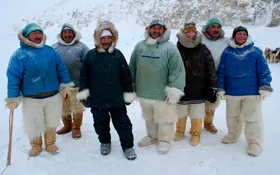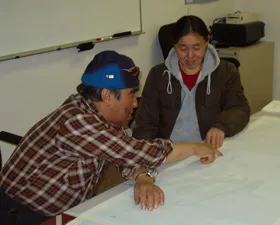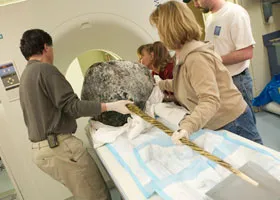"I believe it is time for the harpoon and the computer to work together" — Peter Kattuk, Sanikiluaq, Nunavut
By Jane Beitler
Climate change has come so quickly to the Arctic that Inuit residents describe their environment as "an old friend acting strangely." Climate researchers have begun to seek out Arctic residents and indigenous people because their local and traditional knowledge of the environment is extremely valuable in studying Arctic climate change. NSIDC scientist Shari Gearheard, a resident of Clyde River in Nunavut, Canada, helps foster these partnerships through the Exchange for Local Observations and Knowledge of the Arctic (ELOKA). Members of the NSIDC-based ELOKA team collaborate with communities across the Arctic to help document and preserve local knowledge and make this information easily available.
Recording and sharing traditional knowledge
Many Arctic communities have begun collecting environmental data and gathering traditional knowledge. But it can be difficult to successfully preserve and manage that information and make it available to interested groups, such as Arctic residents, researchers, teachers, students, and decision makers. To help communities overcome this challenge, ELOKA provides a network and data management system that supports traditional knowledge and community-based research that will help
- capture extremely precious data that may otherwise be misplaced or lost when elders pass away
- generate awareness of studies being conducting with various communities to avoid repetitive research and maximize financial resources
- provide a data management system that encourages community-based research.
ELOKA currently manages data for projects conducted by several indigenous communities in the Hudson Bay region, Baffin Island, and Greenland. Not only are local residents observing and reporting changes in their environment, they are also sharing wisdom gleaned from generations of living in an Arctic environment, providing valuable references for scientists and researchers.
Tracking traditional observations of sea ice
Sanikiluaq is one of the southernmost Inuit communities in Nunavut, Canada, located on the Belcher Islands in Hudson Bay. Hunters draw on traditional knowledge of climate to find animals and navigate around the islands. However, sea ice conditions in Hudson Bay have recently become unstable and less predictable. To document these changes, the Municipality of Sanikiluaq partnered with the Government of Nunavut and Nunavut Tunngavik to form a Nunavut Hudson Bay Inter-Agency Working Group, also known as Nunavuummi Tasiujarjuamiuguqatigiit Katutjiqatigiingit, or NTK. Furthering Sanikiluaq's environmental work, the community collaborated with ELOKA on the Sanikiluaq Sea Ice Project. Three Sanikiluaq hunters were interviewed and provided their observations of local sea ice conditions. ELOKA will archive and distribute the resulting information and has created a Web site to share the videos and maps that record changing conditions around the islands.
Investigating the narwhal tusk
Martin Nweeia, from the Harvard School of Dental Medicine, initiated the Narwhal Tusk Research project as an interdisciplinary and cross-cultural investigation to explore the secrets of traditional knowledge from Inuit communities in Nunavut and northwestern Greenland. This collaborative approach, combining scientific research and Inuit knowledge, reveals that there is much more to the narwhal tusk than scientists imagined. ELOKA is collaborating with Nweeia to provide Web access to the interviews and data he gathered during his research.
Continued partnerships
In addition to partnering with a growing number of communities, ELOKA team members also collaborate with similar pan-Arctic research initiatives and organizations to raise more awareness about the need for local and traditional data management. Examples include Inuit Tapiriit Kanatami (ITK), the national Inuit organization in Canada; the Russian Association of Indigenous Peoples of the North (RAIPON); and the LTK component of the Sustained Arctic Observing Network (SAON), an initiative of the Arctic Council. By providing data management and user support among Arctic communities worldwide, ELOKA will help preserve generations of local and traditional knowledge and ensure access to this irreplaceable information for generations to come. Read more about the traditional knowledge to which ELOKA is providing access at the ELOKA Web site.


